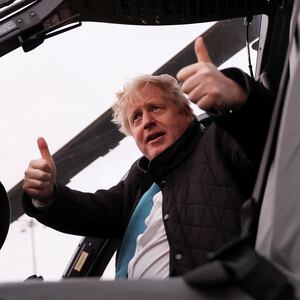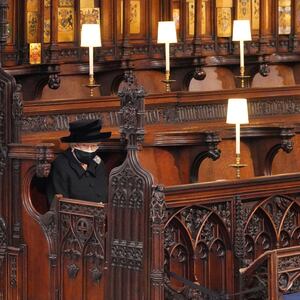Booze will bring down Boris Johnson. Not his own boozing, but the boozing culture he introduced to No. 10 Downing Street.
In fact, the scandal of the mindless partying at the center of what passes for government in London has its roots in the confluence of two streets, Downing Street and Fleet Street.
You would think, from all the pious commentary in the London papers about this stuff that the nation’s journalists are a model of temperance. Their hypocrisy is, in truth, of the same order as that shown by the Tory political elite who so readily broke the pandemic rules they laid down for the rest of the people.
Let me introduce a pivotal figure to this story. His name is Lunchtime O’Booze. He is an invention of the satirical magazine Private Eye, first appearing as a columnist in the 1970s, as a master storyteller using the idiom of an inebriated but, at the same time, extremely fluent and well informed journalist.
Over time, this character became a kind of laureate among the London hacks, someone who, though seldom sober, could pick up the juiciest gossip in the capital and relay it with relish and malice aforethought. O’Booze seemed so convincing because the world he occupied was so recognizable. More journalists were concentrated in one place, Fleet Street, than in any other city in the world. And many of them, like O’Booze, enjoyed long and liquid lunches.
In a business with the unrelenting deadline pressures of journalism, boozing was obviously an occupational hazard. When I arrived in Fleet Street in 1955, the heyday of hot metal dailies, post-presstime boozing was a rite of passage. Each paper had its own pub. The sub-editors, of whom I was one, were equivalent to the re-write deskmen in American newsrooms, and they needed instant booze to decompress. Peak time in the pubs began around 9 p.m. and lasted until closing time at 11 p.m.
Top editors, however, could drink long after the pubs closed. They belonged to the Press Club, no more than a five-minute walk from most newsrooms, where the bar was open until 3 a.m. Quite often, by that hour, they were no longer fit to walk and were collected by their personal drivers, and, as often, had to be awakened on arrival home.
And it was the nightly Press Club piss-up that gave me my first big break. I was working as the deputy features editor of the Daily Express in October 1957, on the night the Russians launched the first orbital satellite, Sputnik—the only editor left in the newsroom. The others had either gone home or were beyond coherence in the Press Club. Together with the science editor, I produced a new front page with the headline: Dawn of the Space Age. With that, I became features editor.
It was always a struggle in Fleet Street to be convivial and successful without ending up as a drunk. I saw many promising careers burn out too soon in a clinging vapor of alcohol. The higher you rose, the more inescapable the boozing became, as I saw when I reached the executive floor of the Daily Mirror group, a level that had its own elevator.
The editor who created, with the Mirror, the modern British tabloid, Hugh Cudlipp, presided over the festivities. Each executive had his own suite, complete with bathroom and bar, serviced by a butler, who ensured a stock of the finest vintages of Bordeaux, in my case 1961 Chateau Lafite Rothschild (we philistines were drinking the legendary wine while it was far too young). Every day, bottles were uncorked and decanted at noon. Before the red wine, and lunch, we would have champagne. Cudlipp had famously hollow legs. He could down a couple of bottles and then descend to the newsroom to compose a cogent front page, while weaker beings like me retired for a siesta.
I couldn’t sustain that kind of life for long, and I left Fleet Street for television, which, in comparison, seemed as sober as a seminary. Eventually, as hot metal gave way to the age of computers and websites, Britain’s national papers left Fleet Street, losing more than a geographical locus. As the vocational culture dispersed, it lost its collective dissipation—although, let it be said, quite a few pubs still live well off the urgent thirst of hacks.
Fleet Street had its origins in the seventeenth-century coffee houses that sprang up in streets and alleys where political pamphlets, frequently seditious, were circulated. In those days, ironically, the coffee was offered as proof of sobriety by men who, to quote a proclamation of the day, declared that “there’s ten times more treason in brandy and ale.”
Boris Johnson began his Fleet Street career at The Times in 1987, but within a year he was fired for making up a quote. Future editors were more tolerant of his inability to distinguish fact from imagination, and he began crafting his public character as a kind of entertaining but slightly dodgy young Falstaff, with robust appetites, sexual and gastronomical—but never a drunk. This role was perfected when he became editor of the conservative weekly, The Spectator, in 1999.
That job had long involved hosting some of the best networking parties in London, but Johnson extended the weekly editorial conference into a long and liquid lunch party that gathered guests from the worlds of journalism, politics, and celebrity. He was following a model created by Private Eye, where Lunchtime O’Booze and the magazine’s editors encouraged indiscreet gossip over lunch from guests who, as sources, were guaranteed anonymity. Johnson’s lunches began with a glass of champagne and progressed into similar feasts of ribald tales from the chattering classes. Sometimes the Spectator lunches themselves provided material for Lunchtime O’Booze by bringing together people who subsequently began adulterous affairs—as Johnson did with a colleague.
The Downing Street scandals can now be seen as the inevitable culmination of the Johnson persona as it evolved at those parties. There is the Churchill impersonator, with the pre-lunch champagne and a belief that greatness was that easy to acquire, while having the attention span of a jester who loves the sound of his own voice but can’t be bothered with details. There is the avid seeker of contacts who could advance and fund his political career. There is the faithless husband and lecher.
And, of course, Johnson made it to the top of the greasy pole. And, once there, sitting at the peak of power, he believed he could continue to play the convivial and frivolous host to a cohort of strivers and scofflaws who owed their jobs to him. While asking the rest of the country to curtail the freedoms of mobility and family life in the middle of a pandemic, Johnson made no such sacrifices himself. The urge to party remained and was frequently indulged. Inside his head, the habits and world of Lunchtime O’Booze could not be foresworn.








